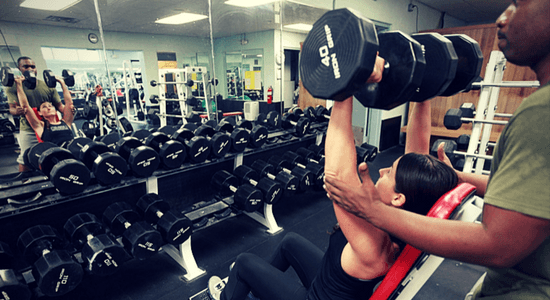At the start of every personal trainer’s career is a series of “What’s the best…?” questions. Most of them turn out to be mostly bad questions that really don’t matter. Admittedly, I asked these questions early on in my career, too, but I quickly learned that they merely distracted me from what I truly needed to ask and do.
As you start and progress in your career, you’ll inevitably run into many of these (and maybe think about them yourself), but my hope is that this article steers you away from these counterproductive questions and, instead, sets you up for a more fulfilling personal training career by asking the right ones.
Here are the 10 bad questions every personal trainer asks and my answers to them.
Question 1. What certification should I get to get me the best job?
At first glance, a personal trainer certification is just a paper that you paid for. Of course, its true value is that somebody with far more experience has organized their massive reserve of knowledge into a repeatable system that you can learn and implement yourself. Some gyms require particular certifications and others don’t. If you want to work for a specific gym, ask them which certification they prefer if they do.
Your clients, however, won’t have any idea or care about what the letters behind your name means. They’re not going to ask you whether you did a weekend or a two-year course-- they wouldn’t know the difference!
Simply, a cert gets your foot in the door, but being certified does not mean you are qualified.
The truth is, whichever cert you get doesn’t really matter. All trainers should hold at least some sort of certification that has been accredited by the National Commission for Certifying Agencies (NCCA). You can search for accredited certifications here.
Beyond a baseline, accredited certification that lets you become employed and insured, you should pursue accessory certifications and education that you find interesting to truly make a big impact on your career. Don’t do a course for continuing education credits (CECs) or a certification just because. Do it because you actually want to learn the material that the course teaches.
For more, read this article: Top Personal Trainer Certifications.
Question 2. How can I improve my programming?
Most personal trainers need to be competent programmers. However, what will set you apart from other trainers is your ability to get their client results and to adhere to your program.
The best program is often the one that your client will do. This also means that the best program is one that your client will stick with. Continuously educating yourself at conferences and with books is great, but if your program urges your client to “program hop”, you’re doing a great big disservice to him or her.

To that end, learn Bandura’s social cognitive theory and, more particularly, understand the concept of self-efficacy and how you can encourage it amongst your clientele. Encourage your clients to trust the process by always being confident and responding to questions you can’t answer with, “I don’t know, but I’ll find out.”
Further, the best way to improve your programming is to study great programs, where the writer has included a description of his or her thought process.
Programming is a skill that comes with time and best learned as a combination of study and observation. Don’t be afraid to ask your colleagues, deconstruct popular programs you come across, and absorb books or programs written for the general population.
I speak about this more in the audio lesson below from my audio course, From Certification to Qualification.
Question 3. What are the best books for personal trainers?
Well, obviously I’m going to say that my book, Ignite the Fire, is the best book for personal trainers. Of course, there are plenty of good reads for personal trainers, many of which are not specifically written for fitness professionals. I’ll expand a bit.
First, all trainers should be reading at least one book on business and one on fitness or nutrition at any time. My two (now) famous rules for success are:
1. Do a great job.
2. Make sure that everybody knows about it.
Knowing a lot about fitness without being good enough on the business side can leave you frustrated. Being great at business while having lackluster fitness skills, on the other hand, just bunches you with the rest of the junk in our beautiful yet damaged industry. Don’t be that kind of trainer.
My favorite way to read is to find a popular and well-researched book on a subject, scan it, and circle all of the references from interesting sections that I want to know more about. Then I go to the index of the book, circle all the references and source materials from those sections, seek them out, and dig in deeper.
You see, most popular bestselling books are biased, opinionated, and sensationalized. It’s important that you acquire deep knowledge to base your own opinions off of.
Also, if you read the same books as everybody else, you’ll think the same.
So seek your own path and learn to think differently.
Sure, read the classics, but also trend toward more obscure texts and original research.
That said, I’ve compiled a list of 10 fitness and 10 business books that were most impactful to my career. You can see the list in the link below:
→ The best books for personal trainers
Question 4. How do you make time to read so much?
You don’t have to read for hours and hours at a time. You can carve time here and there to read. Always carry a book with you in case a client cancels and aim to read a minimum of 30 minutes a day. Read for five minutes on the bus or while waiting for coffee, or you can listen to audiobooks.
Making time to read is a decision. Highlight and annotate your books and go back through them often. Reading should not be an optional activity. It is just as important as any other aspect of your business. Block off time for it. Make it a priority.
In my condo, I leave a phone charger at the door where I take off my shoes. Upon entering, my wife and I both plug in our phones. They do not enter our home with us in order to avoid shooting pigs with birds or find Pokemon or whatever time-wasting activities people do with their phones. When we sit on the couch, we pick up a book, even if it’s just for five minutes.
Question 5. How do I build my network?
I don’t like this question because of how matter-of-fact business-like it sounds. People do business with and support those whom they like. The word “networking” implies “If I do this for you, you’ll do something for me” and that’s not how the world works.
Scale your relationship-building by giving a thousand times more than you ever hope for someone to reciprocate.
Send gifts even if it costs you a couple bucks. Wish people well through an email or on Facebook even if it isn’t their birthday. Send a blogger an email telling them that you loved an article and how you took action on it. Just be a good person, show appreciation, and be as supportive as possible.
Facebook is the easiest place to meet other professionals with a similar interest. If you’re looking to meet other top coaches, join The PTDC’s free private Facebook group, Fit Pros Unite. You’re also welcome to follow me on my personal professional page.
Question 6. What’s the best diet?
I’m going to give it to you straight: There are no good diets. The word “diet” signifies a beginning and an end. You and your clients are in this for life.
It’s not complicated.
* Eat a ton of veggies.
* Eat nutrient dense foods.
* Have lots of protein and reduce starchy carb intake.
* Don’t binge on junk food.
* Drink lots of water. Not Vitamin Water, real water.
High-sugar foods fulfill a need, usually emotional, that isn’t being met. The next time you have a craving for junk food, spin around in a circle and force a big smile on your face—you’ll get stupidly giddy and the craving will go away, I promise.
Question 7. What’s the best workout?
A singular best workout? Maybe there is one and maybe there isn’t.
What I do know is that when you compare the best so-called workout to any of a thousand from the middle of the pack, the result will be a negligible difference for most people.
If you’ve got years of intense weightlifting experience, it might matter. For your average clients, it doesn’t. Pick the workout that you feel can get the best results for your client and see it through to the end. Resist the urge to “jump” to another program because it has some appealing cutting-edge hacks.
Question 8. How do I write for magazines?
Everyone wants to write for magazines, but no one wants to write a lot before that happens.
The first step is to become a good writer, which takes practice. Magazines look for two types of writers: innovators and simplifiers. If you don’t have any new, innovative ideas that you can back up with research, become very good at simplifying complex processes and communicating them through your writing.
Start a blog, become an active member in online communities, and support others by commenting intelligently on their work. Add to the conversation instead of continuously trying to look smart by proving the writer is wrong. If you’re good, they’ll find you.
Jen Sinkler, who worked as a fitness editor, did a webinar on the subject for The PTDC. Click here to watch it.
Question 9. What’s the best way to periodize?
Most personal trainers shouldn’t periodize. Linear progression usually works best. Fancy periodization models work well if life revolves around training, but for most it doesn’t.
I wrote an entire article on this: Personal Trainers Shouldn’t Periodize.
Question 10. Have you heard about “X” system?
There’s always going to be a new system promising incredible results. It will tout a new, compelling reason for why it’s so effective (“It confuses your muscles!”).
A program is a program, and it probably works if somebody actually does it. If the program has appropriate regressions and progressions, then go for it but don’t think that there’s anything magical to it.
Bonus question: Should I give advice for free?
No. Not even to family. People don’t take action on free advice because there’s no value associated with it. Charge the person a fee (I used to charge my friends $20) for the advice and either give it back, or donate the money once they take action on it.
For further reading, check out these resources and articles mentioned in this article:
* Jonathan Goodman Facebook Page
* Personal Trainers Shouldn’t Periodize – Jonathan Goodman
* Ignite the Fire: The Secrets to Building a Successful Personal Training Career – Jonathan Goodman
* The PTDC Facebook Page
* Top Personal Trainer Certifications: United States (and Canada here) – Jonathan Goodman
* The PTDC Reading List












